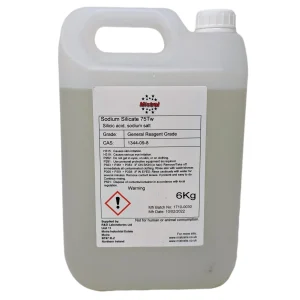Glass is a versatile material that has been used for centuries in various applications, from windows to containers to optical lenses. One of the key ingredients used in glass manufacturing is sodium. In this article, we will explore the reasons behind the use of sodium in glass production, as well as its impact on properties and applications.
Sodium in Glass Composition
Sodium Silicate Liquid Glass
Sodium silicate, also known as liquid glass, is a crucial component in the production of glass. It is a clear, colorless, and viscous liquid that contains sodium oxide (Na2O) and silicon dioxide (SiO2). Sodium silicate acts as a flux in glassmaking, which means it lowers the melting point of the raw materials and promotes the fusion of silica (SiO2) with other compounds.
Improved Glass Properties
Lower Melting Point
One of the primary reasons for using sodium in glass is its ability to reduce the melting point of glass raw materials. Sodium oxide acts as a flux by breaking down the chemical bonds in silica, making it easier for the glass mixture to melt at lower temperatures. This lower melting point allows for more efficient and cost-effective glass manufacturing processes.
Enhanced Transparency
Sodium-based glass compositions tend to be highly transparent. This transparency is essential for various applications, such as windows, lenses, and optical devices. Sodium ions help create a more orderly arrangement of silica molecules, reducing the scattering of light and improving the clarity of the glass.
Increased Durability
The addition of sodium in glass formulations can improve its durability and resistance to chemical corrosion. Sodium ions strengthen the glass structure by replacing some of the silicon atoms in the glass network. This results in a more robust and stable glass material with a longer lifespan.
Cost-Effective Production
Sodium's role as a flux not only reduces the melting temperature but also increases the efficiency of the glass manufacturing process. This leads to lower energy consumption and reduced production costs, making sodium an economically attractive choice for glass production.
Applications of Sodium Glass
Sodium-containing glass finds applications in various industries due to its unique properties:
Sodium Silicate Liquid Glass
- In the field of chemical industry, sodium silicate liquid glass is used as a binding agent in the production of refractory materials, catalysts, and adhesives.
- It serves as a raw material for manufacturing zeolites, which are widely used in detergents and water softening systems.
- Sodium silicate is also used in the construction industry for soil stabilization and as a sealant for concrete surfaces.

Conclusion
In summary, sodium plays a vital role in glass production, primarily through the use of sodium silicate liquid glass. Its ability to lower the melting point, enhance transparency, improve durability, and reduce production costs makes it a valuable component in the glass manufacturing process. As a result, sodium-based glass finds widespread use in a range of industries, contributing to its continued relevance and importance.